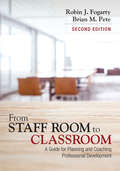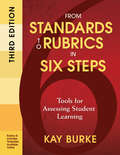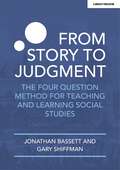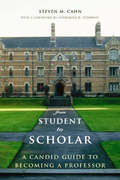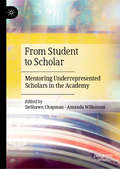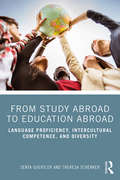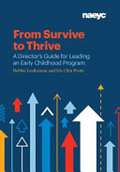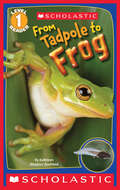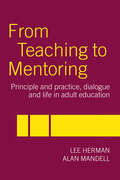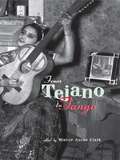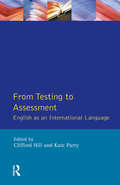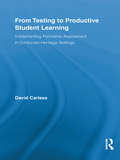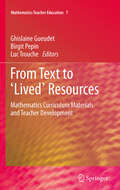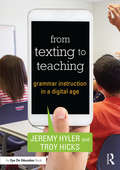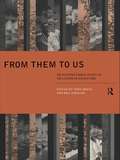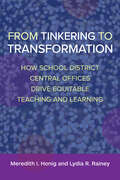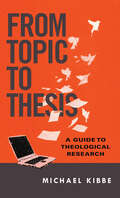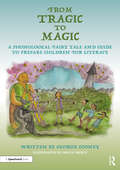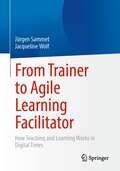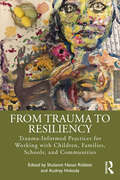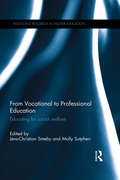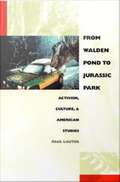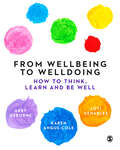- Table View
- List View
From Staff Room to Classroom: A Guide for Planning and Coaching Professional Development
by Robin J. Fogarty Brian Mitchell PeteThe tips and tricks you need to know to make transfer happen! We know that the most expensive in-service is the one that teachers do not apply in the classroom. From Staff Room to Classroom offers district-level leaders, staff developers, and instructional coaches sure-fire tools and strategies for delivering professional learning that answers the question, "How can I use this in my classroom?" This resource provides comprehensive, indispensable guidance on: Effectively reaching and teaching adult learners by understanding their motivations, dispositions, and preferences The six levels of transfer and seven bridging strategies for supporting teachers as they apply content learned in PD to their classrooms and student interactions Updating professional learning to include technological developments and blended solutions Differentiating PD cross-generationally to promote reflective processing Instill effective professional development with this guide to raise the rigor of instruction in the classroom and change the culture of your building. "In From Staff Room to Classroom, Fogarty and Pete take us into their world of improving schools through professional development. The authors are very experienced and thoroughly grounded, high-level practitioners in their specialty." —Bruce Joyce, Author of Realizing the Promise of 21st-Century Education
From Staff Room to Classroom: A Guide for Planning and Coaching Professional Development
by Robin J. Fogarty Brian Mitchell PeteThe tips and tricks you need to know to make transfer happen! We know that the most expensive in-service is the one that teachers do not apply in the classroom. From Staff Room to Classroom offers district-level leaders, staff developers, and instructional coaches sure-fire tools and strategies for delivering professional learning that answers the question, "How can I use this in my classroom?" This resource provides comprehensive, indispensable guidance on: Effectively reaching and teaching adult learners by understanding their motivations, dispositions, and preferences The six levels of transfer and seven bridging strategies for supporting teachers as they apply content learned in PD to their classrooms and student interactions Updating professional learning to include technological developments and blended solutions Differentiating PD cross-generationally to promote reflective processing Instill effective professional development with this guide to raise the rigor of instruction in the classroom and change the culture of your building. "In From Staff Room to Classroom, Fogarty and Pete take us into their world of improving schools through professional development. The authors are very experienced and thoroughly grounded, high-level practitioners in their specialty." —Bruce Joyce, Author of Realizing the Promise of 21st-Century Education
From Standards to Rubrics in Six Steps: Tools for Assessing Student Learning
by Kathleen B. BurkePractical tools for translating standards to rubrics and ensuring high student achievement! Burke’s six-step process helps educators create tasks that promote learning for all students and write rubrics linked straight to the requirements of state standards. Featuring templates and sample tasks, rubrics, and units, this updated bestseller shows educators how to create more complex performance tasks, work in grade-level or vertical teams, and: Apply the six-step process to link teaching and assessment to standards Build their own tasks, checklists, and rubrics Differentiate for special needs within standards-linked tasks Share checklists and rubrics with students for ongoing formative assessment and self-assessment
From Story to Judgment: The Four Question Method for Teaching and Learning Social Studies
by Gary Shiffman Jonathan BassettThe Four Question Method identifies the questions that drive the thinking that real people do when they take the human world seriously. The authors, Jonathan Bassett and Gary Shiffman, have figured out how to describe and teach what it takes to answer those questions well. This inquiry method gives educators a way to integrate content 'coverage' – through storytelling! – with practice in thinking skills that are central to history and its affiliated academic disciplines, together called social studies. The Four Question Method helps teachers to plan more effectively and students to learn more effectively. It provides guidance for writing research essays. And it transfers: the skills our students practice will work for them when they encounter and make their own history.
From Student to Scholar: A Candid Guide to Becoming a Professor
by Steven CahnSteven M. Cahn's advice on the professorial life covers an extensive range of critical issues: how to plan, complete, and defend a dissertation; how to navigate a job interview; how to improve teaching performance; how to prepare and publish research; how to develop a professional network; and how to garner support for tenure. He deals with such hurdles as a difficult dissertation advisor, problematic colleagues, and the pressures of the tenure clock. Whether you are beginning graduate study, hoping to secure an academic position, or striving to build a professorial career, Cahn's insights are invaluable to traversing the thickets of academia.
From Student to Scholar: Mentoring Underrepresented Scholars in the Academy
by DeShawn Chapman Amanda WilkersonThis edited volume sheds light on the lived experiences of underrepresented scholars as they transitioned into their professional roles. Bringing together the stories of doctoral students, practicing scholars, and preeminent scholars in the field of education, the book focuses on the development of voice and scholarship within underrepresented populations in colleges of education and the intersectionality of mentoring. Throughout the book, authors highlight the impact that sources of support and development, such as the American Association of Colleges for Teacher Education (AACTE), had on doctoral degree completion and post degree attainment professional endeavors. Overall, the collection shares and contextualizes experiences and implications of support regarding career advancement related to diversifying higher education faculty and administration.
From Study Abroad to Education Abroad: Language Proficiency, Intercultural Competence, and Diversity
by Senta Goertler Theresa SchenkerComprehensive and evidence-based, this book presents the best practices for designing and sustaining study abroad programs to maximize the outcomes and benefits of education abroad for all students. Distilling the history, research, and variations of study abroad programs, Goertler and Schenker provide a clear-eyed analysis of the lessons learned and the common obstacles associated with education abroad. Organized in three parts – the state of education abroad in the US; research on education abroad outcomes; and best practices – Goertler and Schenker demonstrate the benefits of long-term study abroad for the development of advanced language skills and intercultural competence, and the need for diversity in participation. Chapters offer theory-based, practice-proven recommendations to invigorate, innovate, and implement successful study abroad programs that are sustainable and ethically engage with the local community. The authors discuss design features to maximize language proficiency and intercultural competence. Grounded in up-to-date research and theory, the book responds to the challenges associated with long-term education abroad programs and provides recommendations on (re)invigorating long-term programs and diversifying participation in education abroad. From Study Abroad to Education Abroad is vital reading for academics, researchers, and students in the fields of language education and education policy, as well as practitioners, such as language program coordinators and education abroad administrators.
From Survive To Thrive: A Director's Guide For Leading An Early Childhood Program
by Iris Chin Ponte Debbie LeeKeenanWith so many demands and limited time, being an early childhood program leader is more challenging than it's ever been. This guide, grounded in current research and based on the experiences of the authors as well as directors from across the country, blends theory with practical tips you can implement immediately. <p><p> Plus, each chapter recommends additional resources you can explore to take your knowledge and professional development to the next level. Use the guidance and strategies contained in this book to go from surviving in your role as director to thriving in it.
From Tadpole to Frog (Scholastic Reader, Level 1)
by Kathleen Weidner ZoehfeldHow DOES a tadpole become a frog?Watch a tiny tadpole grow into an adult frog in this book full of facts and photographs. Learn what tadpoles eat, how they survive, and how they transform into frogs.
From Teaching to Mentoring: Principles and Practice, Dialogue and Life in Adult Education
by Alan Mandell Lee HermanWhat is mentoring? What makes a teacher a mentor?From Teaching to Mentoring is an argument for the power, practicality and the basic good of a simple educational idea. The authors advocate a sound, comprehensive and lifelong education, shifting the emphasis of the learning process to the needs of the student. Whilst heeding traditional criteria of educational excellence, they ask for profound educational and political transformations:* Teachers become collaborative inquirers with their students* Students become skilled and lifelong independent learners* Academic institutions become learning communities embracing the full diversity of human curiosity and experience.The book covers discussion on what mentoring is, and why it is now so much in demand. It details the distinctive features of mentoring, including asking questions, students' reflections and responses and collaborative curriculum planning.Drawing upon two decades of extensive research and practice, and using a variety of illuminating case studies, the authors offer a stimulating and thorough examination of mentoring. This combination of theory and practice will be invaluable to anyone involved in the teaching of adults in further and higher education, as well as university administrators, programme directors and developing and training officers.
From Tejano to Tango: Essays on Latin American Popular Music
by Walter Aaron ClarkAuthor of two books on Issac Albeniz, including Issac Albeniz: A Guide to Research (1998), Walter Aaron Clark has compiled thirteen essays that discuss the various aspects of Latin American music. The essays cover the social and political impact the music generated as well as the rhythmic development of the various genres. In this essential book, significant personalities, including Carmen Miranda, are discussed. The scope of the contributors is vast as divergent musical styles such as the Macarena dace craze, Bob Marley's reggae music and the seductive strains of the tango are analyzed.
From Testing to Assessment: English An International Language (Applied Linguistics and Language Study)
by Clifford Hill Kate ParryFrom Testing to Assessment: English as an International Language provides a critical review of conventional and alternative approaches to the assessment of English literacy skills in various parts of the world. It presents empirical studies conducted in three major settings: in countries such as Japan and Brazil where English functions as the language of international commernce; in multilingual countries such as Nigeria and Zimbabwe where English is the national language of education and government; and in such countries as Canada, the United Kingdom and the United States where English is the dominant language.The book opens with a discussion of language assessment in relation to debates about the nature of literacy; it concludes with a discussion of policy implications, which is grounded in literacy theory as well as in practical constraints such as available human and material resources.
From Testing to Productive Student Learning: Implementing Formative Assessment in Confucian-Heritage Settings (Routledge Research in Education)
by David CarlessResearch evidence indicates that formative assessment is one of the most effective ways of enhancing student learning. It is, however, difficult to implement successfully, principally because what is tested through summative assessment has such a powerful influence on teacher and student actions. This book scrutinizes the relationship between testing and learning from alternative perspectives to the dominant literature from the major Anglophone countries. It develops the notion of contextually grounded formative assessment practices by analyzing data from schools in the Confucian-heritage setting of Hong Kong. It explores questions such as: • Under what circumstances do tests support or hinder student learning? • How can teachers effectively prepare students for tests and appropriately follow up after tests? • What are the key socio-cultural influences impacting on testing and student learning in the classroom? • How do teachers change in their orientation towards assessment and what support do they require? This text is a valuable resource for education students, professionals and researchers, policy-makers and curriculum developers.
From Text to 'Lived' Resources
by Ghislaine Gueudet Birgit Pepin Luc TroucheWhat kinds of curriculum materials do mathematics teachers select and use, and how? This question is complex, in a period of deep evolutions of teaching resources, with the proficiency of online resources in particular. How do teachers learn from these materials, and in which ways do they 'tailor' them for their use and pupil learning? Teachers collect resources, select, transform, share, implement, and revise them. Drawing from the French term « ingénierie documentaire »,we call these processes « documentation ». The literal English translation is « to work with documents », but the meaning it carries is richer. Documentation refers to the complex and interactive ways that teachers work with resources; in-class and out-of-class, individually, but also collectively.
From Texting to Teaching: Grammar Instruction in a Digital Age
by Troy Hicks Jeremy HylerDon’t blame technology for poor student grammar; instead, use technology intentionally to reach students and actually improve their writing! In this practical book, bestselling authors Jeremy Hyler and Troy Hicks reveal how digital tools and social media – a natural part of students’ lives – can make grammar instruction more authentic, relevant, and effective in today’s world. Topics Covered: Teaching students to code switch and differentiate between formal and informal sentence styles Using flipped lessons to teach the parts of speech and help students build their own grammar guides Enlivening vocabulary instruction with student-produced video Helping students master capitalization and punctuation in different digital contexts Each chapter contains examples, screenshots, and instructions to help you implement the ideas. With the strategies in this book, you can empower students to become better writers with the tools they already love and use daily. Additional resources and links are available on the book’s companion wiki site: textingtoteaching.wikispaces.com
From Them to Us: An International Study of Inclusion in Education
by Mel Ainscow Tony BoothInclusive education has become a phrase with international currency shaping the content of conferences and national educational policies around the world. But what does it mean? Is it about including a special group of disabled learners or students seen to have 'special needs' (them) or is it concerned with making educational institutions inclusive, responsive to the diversity of all their students (us)? In this unique comparative study, the editors have brought together an international team of researchers from eight countries to develop case-studies which explore the processes of inclusion and exclusion within a school or group of schools set in its local and national context. The study includes classroom observation, the experiences of the school day of students and interviews with staff, students, parents and school governors. Through an innovative juxtaposition of the case-studies and commentaries on them, differences of perspective within and between countries are revealed and analysed. The study arose from a dissatisfaction with previous research, which presents 'national perspectives' or seeks findings that have global significance. This book avoids such simplification and draws attention to the problems of translation of practice across cultures. The editors start from an assumption of diversity of perspective which like the diversity of students within schools can be viewed as problematic or as a resource to be recognized and celebrated.
From Tinkering to Transformation: How School District Central Offices Drive Equitable Teaching and Learning
by Meredith I Honig Lydia R. RaineyA model guide for reconceiving the central office to help educational leaders build equity-aligned, research-based approaches to district reform. In From Tinkering to Transformation, Meredith Honig and Lydia Rainey call on superintendents and other district leaders to rethink the very premises that underlie the long-standing ways of working in their central offices. Based on the results of nearly two decades of research from districts of 2,000 to 200,000 students, Honig and Rainey pinpoint how central offices support equitable teaching and learning in schools through specific changes in key central office functions: teaching and learning, human resources, principal supervision, operations, and the superintendent's cabinet. Using lively case studies, detailed examples, and performance data from ten US school districts, Honig and Rainey deftly highlight how central offices must transform in order to support equitable teaching and learning in schools. They identify typical pitfalls district leaders may encounter, illustrate a guiding set of design principles that can be used to inform transformation efforts, and offer practical advice on how to realize the ambitious goals of fundamental systemic change for equity. This inspiring work shows how district leaders can move forward with revolutionary central office reforms that support equitable teaching and learning for every student.
From Topic to Thesis: A Guide to Theological Research
by Michael KibbeWhile courses in Bible and theology typically require research papers, particularly at the graduate level, very few include training in research. Professors have two options: use valuable class time to teach students as much as they can, or lower their standards with the understanding that students cannot be expected to complete tasks for which they have never been prepared. From Topic to Thesis: A Guide to Theological Research offers a third option. This affordable and accessible tool walks students through the process, focusing on five steps: finding direction, gathering sources, understanding issues, entering discussion and establishing a position. Its goal is to take students directly from a research assignment to a research argument—in other words, from topic to thesis.
From Tragic to Magic: A Phonological Fairy Tale and Guide to Prepare Children for Literacy
by Georgie CooneyThis engaging and colourful story and guide has been created to prepare children for reading and spelling through the recognition of phonological patterns such as rhyme, syllables and the awareness of phonemes within words. By working on and strengthening language skills, in turn, you are building children’s literacy abilities – together. A prequel to the storybook, Who Put the Spell into Spelling?, From Tragic to Magic tells the story of three siblings who set out to rescue their teacher, Miss Tragic. As they battle with a giant, a witch and a wizard, they encounter three phonological challenges that focus on syllables, rhyming and phonemes. Key features include: Games and prompt questions for each chapter, based on Bloom’s Taxonomy, to assess memory, understanding, application, analysis, evaluation and creativity A selection of additional activities to help to continue developing phonological awareness beyond the story Guidance and support for the adult reader throughout With beautiful accompanying illustrations, this fun fairy tale provides an exciting and imaginative way of preparing children up to 7 years old for phonics, reading and spelling at primary school. It is an essential resource for parents, carers, grandparents and early educators.
From Trainer to Agile Learning Facilitator: How Teaching and Learning Works in Digital Times
by Jacqueline Wolf Jürgen SammetPure face-to-face training is increasingly being supplemented or even replaced by modern forms of learning such as blended learning, online training, e-learning and informal learning. What does this mean for you as a trainer (lecturer, speaker, personnel developer)?This reference book shows how the job description of the trainer is changing due to digitalisation and which competences you need as a trainer to be successful in the "learning revolution". After all, specialist knowledge paired with classroom didactics is no longer enough.This work takes you by the hand to become a learner again as a trainer and to develop into an "agile learning facilitator". It gives you orientation in the digital "trainer competence jungle". In a practical and clearly understandable way, you will receive both theoretical background knowledge and practical implementation possibilities for the modernisation of your continuing education programme.
From Trauma to Resiliency: Trauma-Informed Practices for Working with Children, Families, Schools, and Communities
by Shulamit Natan Ritblatt and Audrey HokodaFrom Trauma to Resiliency integrates research and practice of trauma-informed care, reviewing the neuroscience of trauma and highlighting relationship-based interventions for diverse populations that have faced multiple traumas. Chapters explore the experiences of oppressed groups that include survivors of abuse, war, poverty, Indigenous youth, Middle Eastern refugee mothers, individuals who identify as sexual and/or gender minorities (SGM), and children and youth involved in child welfare, foster care, and juvenile justice systems. In each chapter, contributors provide strengths-based, trauma-informed strategies that can be used in clinical settings, school-based programs, and in urban communities where food insecurity, limited access to health services, and community violence are prevalent. Professionals and students in counseling, social work, psychology, child welfare, education, and other programs will come away from the book with culturally affirming, trauma-informed interventions and models of care that promote well-being and resilience.
From Twinkle, With Love: The funny heartwarming romcom from the bestselling author of When Dimple Met Rishi
by Sandhya Menon'There's something irresistible about Sandhya Menon's novels - the romances are sweet and winning, the humor is cheerful and sly, and the families are warm and complicated' Stephanie Perkins__________________________________________Aspiring filmmaker and wallflower Twinkle has stories to tell - if only the world would listen. So when nerdy classmate and fellow film-obsessive Sahil approaches her to direct a film for the upcoming Summer Festival, Twinkle can't wait. The chance to showcase her artistic voice? Dream come true. The opportunity to get closer to longtime crush, Neil - aka Sahil's twin brother? Dream come even truer.When Twinkle receives an email from a secret admirer - the mysterious 'N' - she is sure it's Neil, finally ready for their happy ending. The only problem is that, in the course of their movie-making, she has found herself falling for Sahil - the wrong brother.Twinkle soon realises that resistance is futile: the romance she's got is not the one she scripted... But will it have a happy ever after anyway?__________________________________________Praise for Sandhya Menon and From Twinkle With Love:'The hug your heart most certainly needs' Book Riot'Funny and sweet' Buzzfeed'Sandhya Menon is a welcome and needed voice in YA' Katherine Webber
From Vocational to Professional Education: Educating for social welfare (Routledge Research in Higher Education)
by Molly Sutphen Jens-Christian SmebyOne of the most important routes to employment within the social welfare sector worldwide is higher education, which equips students not only with the knowledge for employment, but with the tools to use and build on this knowledge. During the last few decades there has been an academic drift in professional education, especially for many shorter professional programmes. Many of these shorter programmes have left the realm of vocational education to enter higher education. On the one hand, graduates are confronted by an increased demand for research and evidence-based knowledge, and on the other, they are criticised for lacking the knowledge and skills relevant for professional work. From Vocational to Professional Education presents new research into programmes suggesting how best to prepare students for professional work and addresses the challenges facing the education of professionals for social welfare. The book identifies and clarifies key problems, as well as outlining the political and historical context in which they are embedded. Chapters discuss theoretical and analytical ways to address these challenges and suggest recommendations for the further development of education for professional practice. Based on comprehensive longitudinal research data, the book will appeal to policy makers, leaders of higher education, and teachers and researchers involved in programmes qualifying students for professional work.
From Walden Pond to Jurassic Park: Activism, Culture, & American Stduies
by Paul LauterPaul Lauter, an icon of American Studies who has been a primary agent in its transformation and its chief ambassador abroad, offers a wide-ranging collection of essays that demonstrate and reflect on this important and often highly politicized discipline. While American Studies was formerly seen as a wholly subsidiary academic program that loosely combined the study of American history, literature, and art, From Walden Pond to Jurassic Park reveals the evolution of an independent, highly interdisciplinary program with distinctive subjects, methods, and goals that are much different than the traditional academic departments that nurtured it. With anecdote peppered discussions ranging from specific literary texts and movies to the future of higher education and the efficacy of unions, From Walden Pond to Jurassic Park entertains even as it offers a twenty-first century account of how and why Americanists at home and abroad now do what they do. Drawing on his forty-five years of teaching and research as well as his experience as a political activist and a cultural radical, Lauter shows how a multifaceted increase in the United States' global dominion has infused a particular political urgency into American Studies. With its military and economic influence, its cultural and linguistic reach, the United States is--for better or for worse--too formidable and potent not to be understood clearly and critically.
From Wellbeing to Welldoing: How to Think, Learn and Be Well
by Abby Osborne Karen Angus-Cole Loti VenablesDo you sometimes find yourself trying to juggle the demands and pressures of learning, whilst also trying to look after your own wellbeing? Then you have come to the right place! This book will introduce you to simple and practical techniques designed to remove a lot of the anxiety around learning. Not only will these techniques help you to achieve and succeed in your studies, but also take control of your own learning and support your wellbeing. Whether you are trying to tackle an assignment, juggle pending deadlines, or revise for an exam, these tried and tested techniques will help you save time and energy, look after yourself, and develop an approach to learning that is right for you. What’s more, the Welldoing strategies are transferable and can also be used in your home and working lives to help you to think, learn and be well.
